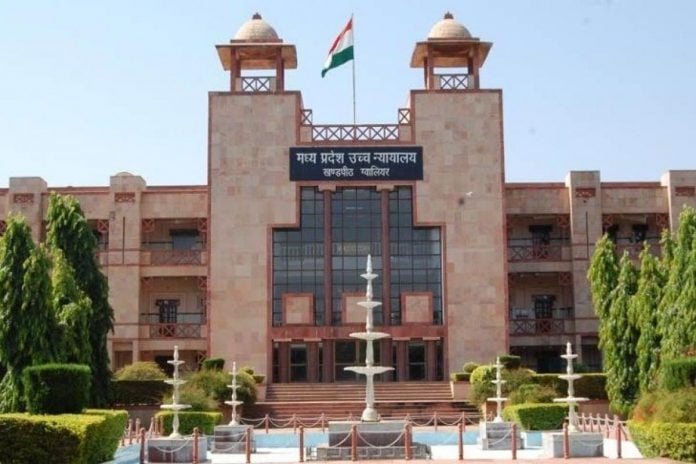The Madhya Pradesh High Court on Tuesday set aside the detention order under the National Security Act (NSA) passed by a District Magistrate against a businessman.
The Division Bench of Justice Prakash Kumar Shrivastava and Justice Vijay Kumar Shukla said, “Having regard to the circumstances of the case, we are of the opinion that material pointed out in the matter may make out a case for taking action under the provisions of Food Safety Standard Act, if any violation thereof has been found, but it is not a case where the provisions of NSA should be invoked.
“The order passed by the District Magistrate suffers from the lack of appropriate subjective satisfaction in respect of the detention of the Petitioner. Hence, the order of detention cannot be sustained and is accordingly set aside,” it added.
Petitioner Vijay Kukreja said that he is lawfully engaged in the business of making ‘deep liquid,’ which is used for the purpose of religious activities, prayers and offering in religious rituals. It is not an edible item and is only meant for non-human consumption.
The petitioner is a registered manufacturer, who has obtained the trademark and has also obtained all the necessary permissions and licences in this regard.
Further case of the petitioner is that on February 17, 2021, he was taken into custody by the Respondents at Gwalior from Govind Ashram and he was produced before the Magistrate on February 19, 2021 and has been sent to jail. On the same day, the order was supplied to the relatives of the petitioner.
Earlier, an unauthorised inspection of the petitioner’s premises was done by the concerned respondents, therefore, the petitioner had filed application under Section 102 of CrPC before the Chief Judicial Magistrate, Jabalpur on January 23, 2021.
On that application, the Chief Judicial Magistrate had passed the order dated January 30, 2021, which is partly in favour of the petitioner. Further allegation of the petitioner is that the respondents during the search and seizure had misappropriated certain amount and had committed irregularities.
Dheeraj Kumar Tiwari , Counsel for the Petitioner submitted that the allegation of making adulterated ghee is only an assumption and the Petitioner is only manufacturing deep liquid which is used for offering prayers and in this regard he has referred to the licences and permissions obtained by the petitioner. He further submits that during the search of the premises, various irregularities have been committed and in this regard has referred to the order passed by the Chief Judicial Magistrate under Section 102 of the Cr.P.C. and has also submitted that it is a clear case of colourable exercise of power. He has also submitted that earlier a case was registered in the year 2012 and; thereafter, the present case has been registered and the subjective satisfaction has wrongly been arrived at by the District Magistrate.
Counsel for the State has opposed the Petition by submitting that in the year 2012 also similar samples were taken and the samples were not found to be of ghee but of mixture of Vanaspati Oil and flavour etc. and that the Petitioner is manufacturing adulterated ghee in the name of ‘deep liquid’ and he has criminal antecedents as earlier also similar offences were registered against the Petitioner. He has also informed that the authorities have recommended for the extension of the detention period of the Petitioner.
The Division Bench Comprised of Justice Prakash Kumar Shrivastava and Justice Vijay Kumar Shukla while examining the case in the light of those parameters noted that grounds of detention mentions that during the search and seizure on the spot manufacturing and packing of ‘deep dravy’ was found and the raw material for manufacturing ‘deep dravy’ such as palm oil, vanaspati flavouring essence was found and its samples were collected.
The Court referred the case In Kanu Biswas Vs. State of West Bengal (1972) 3 SCC 831 in which the Supreme Court held that the question whether a man has only committed a breach of law and order or has acted in a manner likely to cause a disturbance of the public order, is a question of degree and extent of the reach of the act upon the Society. Public order is what the French call “ordre publique” and is something more than ordinary maintenance of law and order.”
The order reflects that a mere suspicion was expressed that since a mixture of these material gives the fragrence of ghee, therefore, there is a possibility of the users being confused. The Petitioner has enclosed alongwith the petition Trademark Certificate in respect of ‘Dhoop’ and ‘Agarbatti’, ‘Mehndi’, ‘Havan/Poojan Samagri’ (material for worship purpose) non edible fat made by mixture of hydrogenated vegitable oil, non hydrogenerated vegitable oil and flavouring substance and deep liquid for worship(pujan) , the Bench further noted.
The Registration Certificate under the Food Safety and Standard Act, 2006 in respect of food items fat and oils and fate emulsions has also been placed on record which have not been disputed by the respondents.
It was observed by the Court, “Though there is an allegation that the petitioner was making adulterated ghee but nothing reliable has been pointed out by the respondents to show that the Petitioner was manufacturing anything other than the one for which he is registered and licenced.
“The order also does not reflects any instance when any user had confused the ‘deep liquid’ manufactured by the petitioner with pure ghee or anybody was found using it as pure ghee.
“Even otherwise, there is no material to show that the activity of the petitioner had disturbed the even tempo of life or had caused any disturbance in public order. The grounds of detention mentioned about the registration of similar case in 2012. but thereafter, substantial period has lapsed,” the Court added.
Source : ILNS


